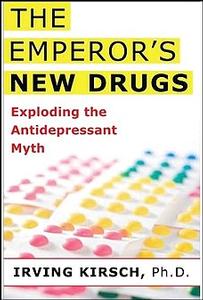
Book - The Emperor's New Drugs: Exploding the Antidepressant Myth, by Irving Kirsch
The Emperor's New Drugs
Exploding the Antidepressant Myth
by Irving Kirsch Ph.D.

Irving Kirsch is Professor of Psychology at the University of Hull in the UK. From the author:
Like most people, I used to think that antidepressants worked. As a clinical psychologist, I referred depressed psychotherapy clients to psychiatric colleagues for the prescription of medication, believing that it might help. Sometimes the antidepressant seemed to work; sometimes it did not. When it did work, I assumed it was the active ingredient in the antidepressant that was helping my clients cope with their psychological condition. According to drug companies, more than 80 per cent of depressed patients can be treated successfully by antidepressants. Claims like this made these medications one of the most widely prescribed class of prescription drugs in the world, with global sales that make it a $19-billion-a-year industry. Newspaper and magazine articles heralded antidepressants as miracle drugs that had changed the lives of millions of people. Depression, we were told, is an illness - a disease of the brain that can be cured by medication. I was not so sure that depression was really an illness, but I did believe that the drugs worked and that they could be a helpful adjunct to psychotherapy for very severely depressed clients. That is why I referred these clients to psychiatrists who could prescribe antidepressants that the clients could take while continuing in psychotherapy to work on the psychological issues that had made them depressed.
But was it really the drug they were taking that made my clients feel better? Perhaps I should have suspected that the improvement they reported might not have been a drug effect. People obtain considerable benefits from many medications, but they also can experience symptom improvement just by knowing they are being treated. This is called the placebo effect. As a researcher at the University of Connecticut, I had been studying placebo effects for many years. I was well aware of the power of belief to alleviate depression, and I understood that this was an important part of any treatment, be it psychological or pharmacological. But I also believed that antidepressant drugs added something substantial over and beyond the placebo effect. As I wrote in my first book, ‘comparisons of anti-depressive medication with placebo pills indicate that the former has a greater effect . . . the existing data suggest a pharmacologically specific effect of imipramine on depression’. As a researcher, I trusted the data as it had been presented in the published literature. I believed that antidepressants like imipramine were highly effective drugs, and I referred to this as ‘the established superiority of imipramine over placebo treatment’.
The drug companies claimed - and still maintain - that the effectiveness of antidepressants has been proven in published clinical trials showing that the drugs are substantially better than placebos (dummy pills with no active ingredients at all). But the data that Sapirstein and I examined told a very different story. Although many depressed patients improve when given medication, so do many who are given a placebo, and the difference between the drug response and the placebo response is not all that great. What the published studies really indicate is that most of the improvement shown by depressed people when they take antidepressants is due to the placebo effect.
Our finding that most of the effects of antidepressants could be explained as a placebo effect was only the first of a number of surprises that changed my views about antidepressants. Following up on this research, I learned that the published clinical trials we had analysed were not the only studies assessing the effectiveness of antidepressants. I discovered that approximately 40 per cent of the clinical trials conducted had been withheld from publication by the drug companies that had sponsored them. By and large, these were studies that had failed to show a significant benefit from taking the actual drug. When we analysed all of the data - those that had been published and those that had been suppressed - my colleagues and I were led to the inescapable conclusion that antidepressants are little more than active placebos, drugs with very little specific therapeutic benefit, but with serious side effects. I describe these analyses - and the reaction to them - in Chapters 3 and 4.
I remain convinced that antidepressant drugs are not effective treatments and that the idea of depression as a chemical imbalance in the brain is a myth. When I began to write this book, my claim was more modest. I believed that the clinical effectiveness of antidepressants had not been proven for most of the millions of patients to whom they are prescribed, but I also acknowledged that they might be beneficial to at least a subset of depressed patients. During the process of putting all of the data together, those that I had analysed over the years and newer data that have just recently seen the light of day, I realized that the situation was even worse than I thought. The belief that antidepressants can cure depression chemically is simply wrong. In this book I will share with you the process by which I came to this conclusion and the scientific evidence on which it is based.
Table of Contents
- Chapter 1 - Listening to Prozac, but Hearing Placebo
- Chapter 2 - The ‘Dirty Little Secret’
- Chapter 3 - Countering the Critics
- Chapter 4 - The Myth of the Chemical Imbalance
- Chapter 5 - The Placebo Effect and the Power of Belief
- Chapter 6 - How Placebos Work
- Chapter 7 - Beyond Antidepressants
